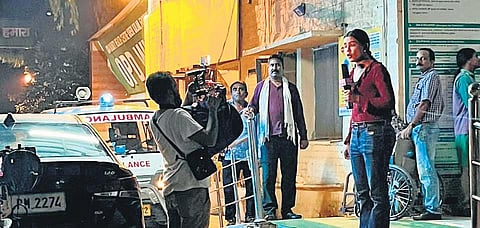

When Bella Sharma, 23, a trans woman, ran away from her home in 2015 and landed on the streets, she did not know what was next. She was 15 then and a school dropout. Circumstances forced her into sex work; life led her to a shelter home; and luck, to a role in a Dibakar Banerjee film. “I always wanted to act,” says Sharma, who is playing the role of a transgender reporter in the film slated for a February 2024 release. But the journey to the big screen has been anything but smooth.
Like most Indian families, Sharma’s family only knew two genders. She enjoyed the company of her sisters, imitating the way they talked, walked, dressed and danced gracefully to her favourite Bollywood songs. That comfort zone disappeared when she went to school. Initially, she enjoyed it, but soon it started “haunting” her. She was bullied for her “feminine behaviour and soon the bullying turned into sexual harassment”.
She wanted to leave her school but her parents were unconvinced, so she decided to run away. Scared, hungry and homesick, Sharma realised that life on Delhi roads was not easy. She decided to go back and join a new school but that experience was not different from the earlier one. This, too, she quit, unable to bear the taunts. “I was so frustrated that I came close to ending my life,” Sharma recalls.
A dark turn
Years passed; Sharma’s family moved back from Delhi’s Shalimar Bagh to Bihar’s Chhapra as Covid-19 took away her father’s job as a factory-floor supervisor.
In July 2020, Sharma returned to Delhi, finding it difficult to bag or hold onto a job. “Wherever I did get employed, I faced harassment and discrimination because of my gender identity,” she says. Helplessness and unemployment compelled her to go down a road she never thought she would. With sex work, “it was quick and a lot of money at once”, she says. Sharma not only sustained her family but was also able to afford a place in Shalimar Bagh on rent so that they could stay with her. “I left home and moved to Sitapuri because I could not continue sex work with my family around. I kept sending money to them, but never told them what I do for a living.”
One day, after almost a year into sex work, sitting in her room, she asked herself:
“What am I doing? Why am I doing this?”
Hope and a jolt
Soon after, she got to know about Garima Greh, a newly opened government-run shelter home for runaway transgenders, maintained by the NGO Mitr Trust. Leaving everything behind, she moved into it in April 2021, becoming its first and the only member. After 15 days, she was joined by fellow runaway trans men and women, who soon became her friends. “I realised that I was not alone.
There were so many people like me,” she says. Sharing sorrows and comforting each other became an everyday ritual, giving Sharma the strength she needed to restart her life. Sharma got herself enrolled in the courses run by the shelter home and learned to work on computers. “I also brushed up on my spoken English,” she says proudly. Sharma also began her sexual transition, with prescribed oestrogen injections.
When Garima Greh started looking for a course coordinator, she applied, and got the job. And finally, she now had the time to pursue her dream of acting. Bold, Mitr Trust founder Rudrani Chettri’s transgender modelling agency—India’s first such agency—came in handy. Sharma went for auditions and began with small modelling gigs. Though not quite acting, it did prepare her to face the camera. “I did some photoshoots for fashion designer Karuna Khaitan and walked on the ramp too,” she says.
On July 22, 2022, policemen from the nearby Dabri Mor police station came and took Aditya, a transman, into their custody. It was 12.38 am, recorded Garima Greh’s CCTV. Sharma, with two of her trans women friends, went to the police station to enquire about Aditya only to be beaten up by the police. The incident was reported by many news outlets. “I became fearless after that incident,” she says.
More determined than ever, Sharma now worked harder and was promoted to project manager. Handling the shelter home’s responsibilities, she continued working on her portfolio and played a lead role in a short film called Mukti Bandhan. Her hard work bore fruit and she got her first big-screen casting call from Balaji Telefilms.
“The audition went on for a long time,” she says. Sharma says that she was first rejected for two of the roles she had auditioned for. “After that, I received another call from them telling me that I might be a fit for another role—of a transgender reporter,” she says. She had no idea then that it was for a Dibakar Banerjee film and that hers was one of the key roles.
Dreams come true
The auditions went on for three days and she was selected. “I was also asked to bring friends from Garima Greh because they needed more transgender people in the background,” she says. October 10 was her first day on the set. After a three-hour-long rehearsal, Sharma did her first-ever scene for the big screen.
“My nervousness went away the second I spoke my lines, even when I was on the set with over 200 people as its crew. The presence of my Garima Greh friends on the set also gave the necessary push. Even Dibakar Banerjee appreciated my performance,” she says.
What’s next? The next adventure, as she returns from another audition, this time, in Mumbai.